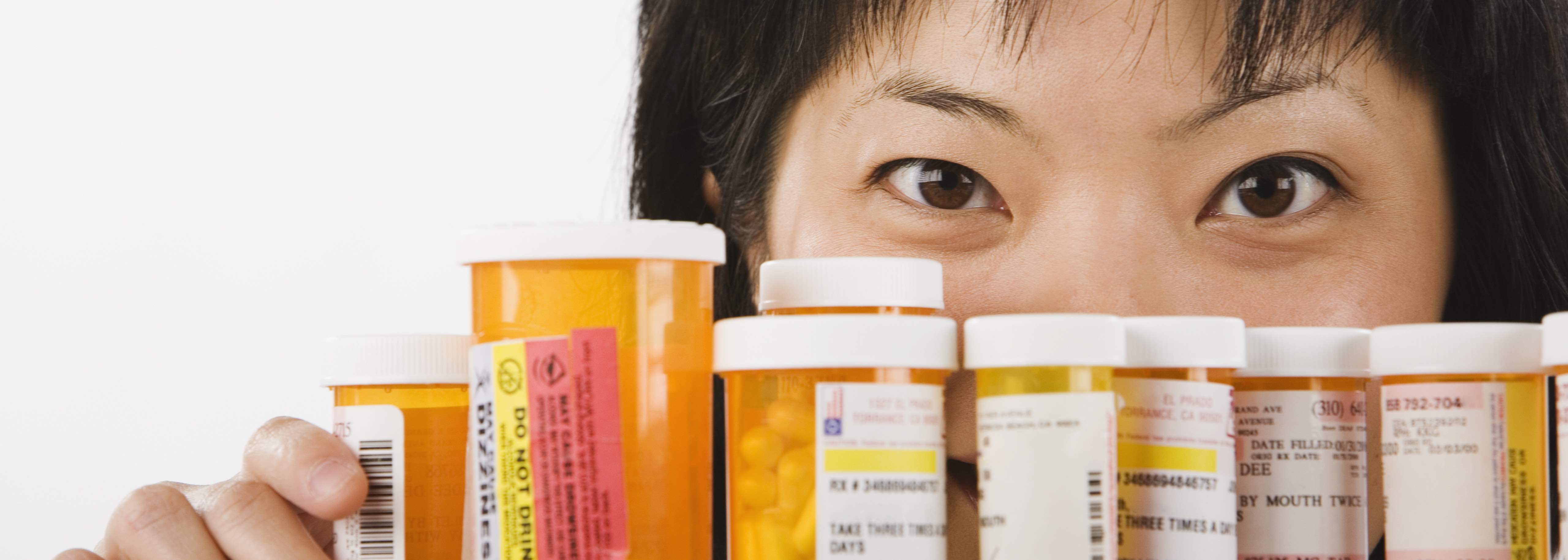
Drug safety in the home isn’t something many of us consider. We may curse a medicine bottle's child protection “features” slowing us from taking a dose, but overall, we’ve become very complacent. Looking at opioids alone paints a very grave picture. Data from Johns Hopkins University Bloomberg School of Public Health indicates 73% of adults surveyed understand that children are more susceptible to opioid overdose, but a mere 13% have concerns over their children accessing them. What’s more, only 12% store their medications safely. Kids aren’t the only ones at risk, though. Read on to find out more about how your medications may be putting you and your family in danger, and what you can do about it now.
1) More than 80,000 Children are Hospitalized for Overdoses Each Year
Data regarding drug overdoses is incredibly difficult to come by, as most statistics lump together all poisonings, including children who are exposed to pesticides and household cleaners. However, we do know that these things together sent more than 600,000 children aged 17 and under to the emergency room over the past five years, and, historically, around 70% of all cases involve medications. In fact, overdose deaths among children nearly doubled between 1999 and 2015. Despite the prevalence of childhood overdoses, the trend shows no signs of slowing.
Prevention Tips for Childhood Medication Overdoses
Lock all your medications up. One-in-five children who overdose sneak the medication from unaware caregivers. Various options to secure medications are available, from cabinets to special lockboxes. Find a solution that works for you and make sure children do not have access to the key.
Never compare medicine to candy when talking to children. It can be tempting to encourage kids to take their medicine by telling them it tastes like candy, but this may cause a child to believe medications are not dangerous. Moreover, many do look and taste like treats, which can cause further confusion.
Dispose of patches properly. Many medications now come in patch form, which can seem like stickers to children. Despite already being used, they often contain enough of the medication to cause death or illness. Patches should always be disposed of in accordance with the manufacturer’s guidelines, while keeping them out of reach of children. Consider taking them straight to your outdoor bin if you have children in your home, or to your local collection site on National Prescription Drug Take Back Day, October 28, 2017.
Carefully measure doses. Even acetaminophen (Tylenol) has the potential to kill, and it sends more than 7,000 kids to the ER yearly. Sadly, about 18% of them are given the medication by caregivers.
2) One-in-Four Teens Admits to Abusing Prescription Drugs
According to Partnership for Drug-Free Kids, “misuse and abuse of prescription drugs is now a normalized behavior among teens,” with nearly one-in-four self-reporting they have abused a prescription drug at least once. This equates to roughly 5.5 million kids, and around 16%, or 2.7 million teens, have abused a stimulant, such as Adderall or Ritalin. Painkillers are a big draw as well, with 10% admitting they’ve abused one within the past year. The FDA further warns of potentially deadly “pharm parties.” During these gatherings, kids bring drugs to share with their friends, often from a medicine cabinet at home. It’s no surprise, then, that 49% of teens who abuse prescription drugs say they’ve gotten them from friends.
Prevention Tips for Teen Prescription Drug Abuse
Lock your medications up. Many parents mistakenly believe that risks reduce as their children age or that their child won’t be one to abuse prescription drugs. The Johns Hopkins survey indicated parents have less concern and are less likely to lock up meds as their children age. At the same time, information from Partnership indicates that 56% of teens think it’s easy to get medications from their parents’ medicine cabinet, and 42% of those who abuse medications say they take them from the medicine cabinet at home.
Don’t share your medications with anyone. Around 20% of parents admit to sharing prescriptions with their kids, which creates a nonchalant attitude about sharing medications. Understand the dangers of prescription drug use and talk to your kids about them. One of the greatest indicators of teen drug abuse is parental stance. Nearly one-third of parents erroneously believe ADHD meds can help their child academically, even if he or she has not been diagnosed with the condition. Moreover, 16% of parents think prescriptions are safer than street drugs.
Get rid of your old or unused medications. It’s estimated that 17% of households keep unused medications around. They should be discarded in accordance with the label. Find a drug collection center if you are unsure how to properly dispose of a medication. Participating in National Prescription Drug Take Back Day on Saturday October 28 is a great first step in tossing your old, unused, or unneeded medications.
3) Adults Aged 45–54 Are the Most Likely to Die from an Overdose
While overdose and abuse among children and teens is still cause for concern, it’s adults who are most likely to die from an overdose. The 45-54 age group has the highest rate of death, at 30 deaths per 100,000 individuals, according to the CDC. Compared to people aged 15-24, those in the age groups of 25–34, 35–44, 45–54, and 55–64 are twice as likely to die of an overdose. It would be easy to chalk these deaths up to suicide, but medical examiners conclude at least 80% of these deaths are unintentional. The greatest culprit is opioids, namely drugs like methadone, oxycodone (OxyContin®), and hydrocodone (Vicodin®), with more than 1,000 people visiting emergency rooms daily after failing to take opioid medications as prescribed.
Prevention Tips for Adult Overdose
Follow your doctor’s instructions. Many people try to “catch up” missed doses by taking more than prescribed, or take more to cope with greater pain. This can prove to be the start of a vicious cycle or a deadly mistake. Be aware that you will build up tolerance to certain medications. One of the greatest dangers of opioids is that people build up a tolerance to them, so more of the medication is needed over time. If you feel like your medication isn’t helping like it used to, talk to your doctor about alternatives or changing your dose.
Be aware that tolerance can reduce rapidly. Under certain circumstances, such as if a person has been ill, not eating, or not taking a dose as prescribed, the tolerance level can go down. The same is true when a person moves from a short-acting to a longer-lasting dose. If a person is unaware that their tolerance has reduced, it’s easy to ingest toxic levels of medications just by taking a normal dose.
Teach your family about symptoms of an overdose and what to do in an emergency. Prescription drug overdoses can become fatal quickly and most happen at home. Talk with your loved ones and teach them what to look for and what to do in case of an emergency, as time is of the essence.
4) Overdoses Come with Many Tell-Tale Signs
Being familiar with the signs of overdose can save a life. Learn the symptoms and share them with your friends and family.
Drowsiness: If a person becomes drowsy for no reason or is not responsive, treat it as a medical emergency. Do not let them fall asleep or attempt to “sleep it off,” as you won’t be able to monitor them and their condition could worsen. It’s also unwise to let them shower in attempt to wake up or make themselves feel better because the temperature change can send them into shock.
Vomiting or Abdominal Pain: Many medication overdoses present with vomiting or severe upset stomach.
Breathing Troubles: Medications such as opioids suppress the respiratory system, so a person may have difficulty breathing or may stop breathing altogether.
Loss of Coordination: Issues like loss of motor control and coordination may signal an overdose or other medical emergency.
Seizures: Though rare, seizures, or uncontrollable muscle contractions, can be a serious warning sign.
Skin Changes: It’s common to see a variety of skin changes in someone experiencing an overdose. Occasionally, the skin may become warm to the touch, though an individual will typically become pale and clammy. If breathing issues are present, a person’s mouth and nails may become bluish as well.
Mood Changes: Sometimes, a person will present with typical Hollywood-style mood changes, such as extreme aggression and irritability. However, anxiety and depression-like symptoms are just as common.
5) You Can Throw Away Your Ipecac
According to the Mayo Clinic, ipecac syrup is no longer recommended. In fact, doing anything to induce vomiting, even if overdose is suspected, can be dangerous.
Tips for Dealing with an Overdose
Learn CPR in advance. This will keep oxygen and blood flowing until emergency crews arrive. If it’s been a few years since you took a class, take a refresher course.
Keep Narcan (also called “Naxolone”) on hand if taking prescription opioids. Narcan is fast-acting and will counter the effects of an opioid overdose. It comes in an injectable form as well as a nose spray. Your friends and family should know where yours is stored and be familiar with how to administer it. You will still need to be checked by a medical professional afterward, but it can save your life.
Perform a quick inspection. Make sure the person does not have anything lodged in his or her mouth, and gather up any bottles of medications that he or she may have taken. The emergency response team will ask questions about any medications the person takes.
Be calm and call 911. Time is precious. If you suspect an overdose, call emergency services right away, even if the person tells you not to. Fast action from trained medical professionals can save a life.
A Final Word from RefillWise
Prescribed medications save lives and improve the quality of lives of people every day, but they do need to be kept properly and taken as instructed. We believe that everyone should be able to live life to its fullest, which is why we’re committed to providing the public with helpful information about prescriptions, as well as access to life-enhancing medications at reduced costs. Whether you take regular medication or your doctor has prescribed a single dose of something like Narcan to keep on hand, our free prescription discount card can make affording your medications easier. Sign up for your free RefillWise prescription discount card on our website or text JOIN to 22822 now.

If you’re looking for a good excuse to chat about your teeth, you get a free pass this October. Known officially as National Dental Hygiene Month, the month-long celebration offers the opportunity to behave like a dentist or let someone know just how important it is to floss. However, if you’re one of the millions of Americans who suffer from dry mouth, clinically referred to as xerostomia, the simple act of talking or extending your tongue can range from mildly unpleasant to downright uncomfortable. The good news is, xerostomia symptoms are fairly easily treated.
What Causes Xerostomia
Occasionally, excessive dry mouth has no known cause, but there are many things that can stop the production of saliva and result in it. The condition is seen most often in certain demographic groups, such as seniors. Specific medications are linked to it, as well as several other medical conditions.
Common Medications Linked to Xerostomia
Antibiotics
Antidepressants
Antihistamines
Anxiety Medications
Blood Pressure Medications
Decongestants
Diuretics
Overactive Bladder Medications
Parkinson’s Disease Medications
Muscle Relaxers
Pain Medications
Common Medical Conditions Linked to Xerostomia
Alzheimer's Disease
Anxiety
Depression
Diabetes
Head or Neck Cancer (while receiving radiation therapy)
Lupus
Parkinson’s Disease
Rheumatoid Arthritis
Sjögren Disease
Stress
Stroke
Why Treatment is Essential
Naturally, those who suffer from xerostomia generally want to correct the problem because their mouth feels uncomfortable or because they want to eliminate some of the other symptoms associated with it. However, the condition can lead to much bigger problems, such as oral infections and tooth decay. This is because saliva keeps the mouth healthy. It regulates pH and helps move food particles away from the teeth, and, perhaps most importantly, it bathes teeth and oral tissue in minerals and good bacteria. Without saliva, the bad bacteria that causes tooth decay can sometimes thrive, the minerals that teeth soak up to stay strong deplete, and tissues lose their protective coating, creating the perfect environment for decay, tissue damage, and infections.
Treatment for Xerostomia
Talk to your doctor. It’s important for a medical professional to evaluate your condition, identify its cause, and determine the best possible treatment for your needs. Your physician may recommend that you switch medications or recommend an alternate treatment. For example, if your condition is worsened by mouth breathing, your doctor may investigate causes like allergies or sleep apnea.
See your dentist twice a year or more. Regular dental care is absolutely necessary if you’re in a high-risk category for decay. Most people should visit twice per year, but your dentist may suggest you visit three or four times if you have specific medical conditions or have a high decay rate. Moreover, your dentist may recommend fluoride to help prevent cavities or another type of mineralizing agent to strengthen your teeth if you’re at risk for decay, in addition to treating the xerostomia.
Use alcohol-free oral hygiene products. If you’re a fan of mouthwash, select an alcohol-free variety. There are many over the counter dry mouth products, such as mouthwash, gel, lozenges and spray that moisturize and protect your mouth.
Suck on sugar-free candy and mints. This increases the production of saliva. Look for something containing the sugar substitute xylitol for its added cavity-fighting benefits, but use it in moderation because it can cause diarrhea in some people with sensitivities.
Cut out tobacco and spicy foods. These can worsen xerostomia.
Drink lots of water. Naturally, staying hydrated will reduce the symptoms associated with dry mouth.
Practice good oral hygiene. To stave off cavities, be sure to brush and floss after every meal.
Run a humidifier. Adding moisture to the air will help keep your oral tissues moist.
RefillWise is Your Partner in Fighting Xerostomia
When consulting with your healthcare provider, know that RefillWise can make prescription options needed to treat conditions and symptoms commonly linked with xerostomia more affordable. Our free card saves 40% on average at all chain and most independent pharmacies. Stick your tongue out at xerostomia. Sign up for your free RefillWise pharmacy discount card or text JOIN to 22822 to instantly save on prescriptions while earning cash rewards for over the counter remedies and other necessities right away.
Did you know that one-in-five Americans suffers from a mental illness? According to the National Alliance on Mental Illness (NAMI), more than 18% of the population (or about 42 million people) live with an anxiety disorder and nearly 7% (or 16 million people) suffer from major depression. This is much more than a case of the blues or simply feeling down, and it has a massive impact on the lives of the people it touches, as well as on their loved ones.
October 2 - October 8 is Mental Illness Awareness Week
If you or someone you care about is struggling with a mental health condition, it’s important to remember that you’re not alone. Chances are, there is someone in your office, your classroom, or on your street who is coping too, though there is also a good chance one of you isn’t getting treatment. Only about 40% of adults and 50% of children receive the help they need. You deserve to live a healthy and full life. It’s time to get help.
Shake Off the Stigma
You are not your illness. Many people feel as if their illness is their identity. It’s important to remember that this is a medical condition you didn’t ask for; the same as diabetes, a broken limb, or even cancer. It does not define you.
Your illness is not a reflection of your character or worth. Several conditions, especially depression, can make people feel as if they’re not worthy or fill them with self-doubt. Recognize that this is a symptom and that it will fade when you get treatment.
Join a support group. Surrounding yourself with people who understand your condition can help you navigate the waters of treatment and remind you that you’re not alone.
Talk openly about mental health. We’ve come a long way as a society in terms of how we view and treat mental illness, but firsthand accounts and openness will further reduce the stigma.

Get Help
Find a mental health professional who will work with you. Some help is better than none, but general practitioners do not have the same training as psychologists, psychiatrists, and counselors. Whenever possible, seek out a specialist who truly understands your condition so that you get the best possible care.
Take your medications as prescribed. Most mental health medications require regular doses at specific intervals and they take time to build up to full efficiency. Always take your medications as directed, and talk to your doctor if you have side effects or don’t feel like it’s working. You may need a different dose or type of medication. If you can’t afford the medication you’ve been prescribed, consider signing up for a free RefillWise pharmacy discount card.
Talk to your boss or school counselor. Just having people know what you’re dealing with can be a huge relief. However, school counselors can put you in touch with resources and support groups as well, and your boss may be able to provide accommodations.
Take advantage of the Americans with Disabilities Act, if need be. People with mental illnesses are protected under the ADA, and you have a right to reasonable accommodations from your employer in most cases. If those accommodations allow you to live a more normal life or make it possible to get treatment, make use of them – it’s your legal right to do so.
Mental health issues cannot be cured overnight and, in some cases, require a lifetime of treatment. However, you are worth the time and investment. Get the help you need to live a full and happy life.
Sign Up for RefillWise
The RefillWise card offers a wealth of benefits, including discounts on common medications, such as antidepressants and those used to treat addictions. If the cost of prescriptions is preventing you from getting the help you need, sign up to receive your free RefillWise card today.
The future of health coverage in the U.S. is uncertain, but the likelihood that Health Savings Accounts will play a more prominent role in the future seems likely. As our friends at freshbenies report, you don't have to know whether or not the ACA may go away to prepare for life with an HSA.

One of the biggest advantages to using a free RefillWise card is that, in addition to being free, it does not drive up insurance premiums. If you don't have insurance, it guarantees a lower price for prescription medicine and durable medical equipment, like nebulizers, diabetes test strips, and crutches. In some cases, the price you pay for prescriptions using RefillWise may be less expensive than a copay with insurance. RefillWise works at all major chain pharmacies and most independent pharmacies, and we're the only pharmacy discount provider sharing our profits with our members by offering you cash rewards — $5 the first time you use your free membership card to fill a prescription, then $5 after every 10th prescription.
Once you sign up via email or text or register online, you immediately receive cash rewards. You also have access to your prescription history, regardless of which pharmacies you used to fill them. We encourage our members to use one card for all the family members they care for so rewards will rack up even faster. But when it comes time to determine how much to contribute to your Health Savings Account, RefillWise offers another nifty advantage: a record of how much your family spends on prescriptions. If you have the option to contribute to an HSA pre-tax, this will help you calculate how much to chip in so your tax burden is as low as possible, all the while maximizing your take home pay and savings. Use your RefillWise account history to determine if the amount of money you put into your HSA is enough to allow you to afford needed prescriptions.
“You can't help getting older,” George Burns once remarked, “but you don't have to get old.” Indeed, aging is not an option, and with it comes a slew of new adventures. If you’re an adult child of someone in or nearing their golden years, you can expect some awkward, funny, and downright silly moments brought on by the changes that come with age.
1) They Can’t Hear You in a Restaurant
(But They’ll Still Hear Your Private Phone Conversations from the Next Room)
Hearing diminishes with age, but perhaps not in the ways one would expect. It has to do with the fine hair cells inside the ear that help translate sound waves into sound. When those die off or diminish, hearing starts to go. It’s very common for seniors to have trouble hearing when there’s background noise because they can’t isolate the sound of your voice, even if you’re sitting at the same table as them in a restaurant. However, it’s almost a guarantee they’ll hear every single word of your phone call whether you step outside or into the next room. Don’t rely on the distance to save you from questions about your love life, job, or anything else you want to keep quiet. If there’s no background noise, they’ll hear your conversation just fine.
2) They Can’t Remember How to Set the DVR
(But They Remember All Your Embarrassing Childhood Moments)
Sir Norman Wisdom once explained, “As you get older three things happen. The first is your memory goes, and I can't remember the other two…” It’s not all memories that go, though. It’s the short-term memory loss that gets most people. That’s why you can show Mom or Dad how to set the DVR one day and have them ask you how to do it again the next. The same is true for things like scheduling appointments, remembering where they put their keys, or something really important they called to tell you. On the flip side, long-term memory stays intact, so they will remember the time you tripped over your own feet on stage and how red you turned every time they mentioned your first crush.
3) They Have Strict Rules You Need to Follow
(But Their Grandkids Can Do No Wrong)
Raising you was a chore. They knew they needed to produce a child who was ready to take on the world and be successful, so there were rules...and lots of them. Those rules made you what you are today. They still have lofty expectations for you, but their relationship with their grandkids is different. Candy before dinner? Sure thing! Running and playing baseball inside the house? Sounds like fun! Don’t question this one; you won’t win. Just be glad they’re enjoying their grandkids.

4) They Won’t Laugh at the Same Things You Do
(But They’ll Laugh Even More at the Little Things)
Researchers aren’t quite sure why, but our sense of humor changes as we age. There’s a good chance you’ll still snicker at someone’s misfortune, crude jokes that target someone, or at self-depreciating humor, but your folks probably don’t. Seniors tend to laugh more at silly things, inconsistency, and wit.
5) They’ll Be Incredibly Open About the Things You Don’t Want to Hear
(But Mum’s the Word When They Need Help)
You will hear about their medical ailments and bathroom behaviors in great detail, often around the dinner table. Considering their hearing is going too, the people at the next table will hear as well. (It’s ok, they probably have aging parents as well, or will someday.) At the same time, autonomy tends to diminish with age, and the more you pick up the slack, the more likely they are to avoid tipping you off when they need help with something because they’ll want to try to manage it alone. It’s a lot like the inverse of your teenage years. Take heed with this one and do your best to create a balance that preserves their ability to make decisions and tackle tasks on their own as much as possible. It’ll help ensure they do come to you when they need assistance.
Get Help When You Need It
Although some of the things associated with aging can be humorous to seniors and their family, there are times when things like memory loss and medical issues are a genuine concern, and these should be addressed by a physician. With the help of prescription medicines and medical equipment, people are living richer, fuller lives, and living longer than ever before. RefillWise celebrates this, and helps make it easier for people to afford the things that enhance their lives. With our prescription discount card, members save an average of 40%, and can also receive discounts on medical equipment like canes which allows them to remain mobile and autonomous longer. Moreover, those who obtain a RefillWise card are automatically enrolled in our rewards program, providing gift cards that can be used on anything from groceries to medicine, personal care items, and even entertainment. If you use your RefillWise card to pick up prescriptions for them or other family members in your household, you will earn cash rewards even faster. Your parents can text JOIN to 22822 or you can use your email to sign your parents up on our site for their free RefillWise pharmacy discount card today.






